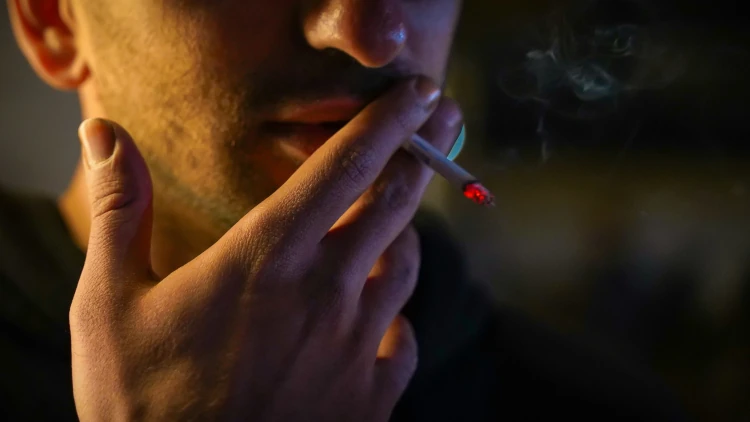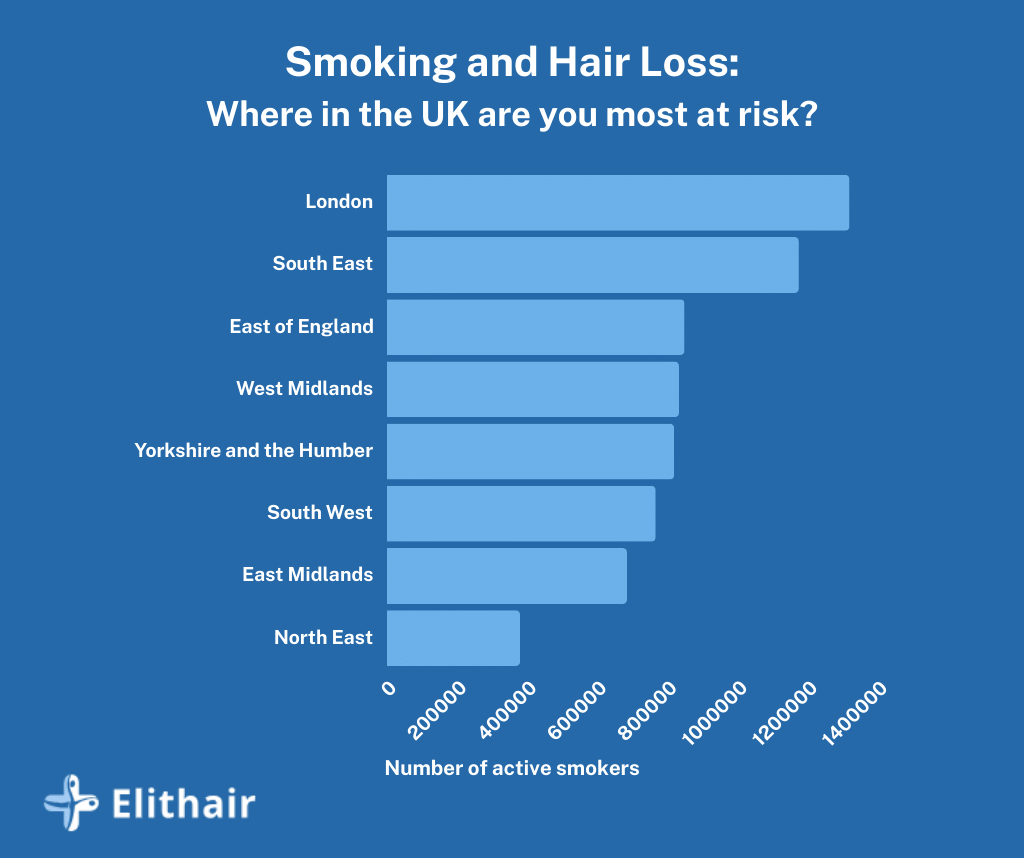
Smoking & Hair Loss in the UK: What the Research Shows (2026 Guide)
According to recent research, approximately 6.5 million men and 8 million women across the UK are impacted by hair loss; the most common cause being androgenetic alopecia (AGA). This genetic predisposition can be triggered by chemicals present in cigarettes. Androgenic alopecia, also known as male/female pattern baldness, has been found to impact 85% of men and 40% of women by the age of 50.
The Journal of Cosmetic Dermatology has released a study which has found that men, who are former or current smokers and smoke at least 10 cigarettes per day, are significantly more likely to develop androgenetic alopecia compared with those who have never smoked.
How Does Smoking Affect Hair and Scalp Health?
Here are the main mechanisms by which smoking may damage hair follicles and accelerate hair thinning:
| Mechanism | What happens | Evidence grade* |
| Vasoconstriction / impaired circulation | Nicotine narrows scalp vessels → less oxygen & nutrients reach follicles → slowdown in hair growth. | Moderate |
| Oxidative stress and free radicals | Tobacco smoke generates free radicals that damage follicle DNA and protein matrix → follicle ageing/miniaturisation. | Moderate |
| Hormonal and enzyme disruption | Smoking may elevate DHT sensitivity, alter estrogen/androgen levels, shift growth cycle phases. | Emerging |
| Follicle environment inflammation | Smoking triggers inflammatory mediators around follicles, potentially pushing them into resting (telogen) phase prematurely. | Moderate |
*Evidence grade indicates strength of research to date.
In simple terms: think of smoking as adding extra strain on your hair follicles. If you’re already vulnerable (genetics, hormones, poor nutrition), smoking speeds up the process.
Which Areas of the UK are Most at Risk?

According to Public Health Profiles data, London has the highest number of active smokers, per region in the UK, with 1,318,236 recorded from 2021 to 2022. London also recorded the lowest percentage of successful quitters year on year – with just a 0.8% decrease in the number of smokers compared to 2020/21. This equates to 1 in 7 people in London who actively smoke; a total of 15% of London’s overall population.
The South East ranks second in the list, with 1,173,783 smokers recorded from 2021 to 2022, revealing that approximately 14% of the overall community over the age of 15 smoke, making it another significant region where the prevalence of smoking could correlate with a higher risk of hair loss.
Following just behind is the East of England, which saw just a 1.6% decrease in smokers between 2021 and 2022, suggesting that a notable portion of the population is engaging in a lifestyle factor known to worsen hair loss issues.
Are Your Smoking Habits Causing Your Hair Loss?
Androgenetic alopecia can present initially as hair thinning, alongside a loss in a well-defined hair pattern, often characterised by the hairline receding to form an ‘M’ shape.
If smoking is contributing, you may notice:
- Earlier onset of thinning (20s-30s) rather than later.
- More rapid progression of typical pattern baldness (temple recession, crown thinning).
- Diffuse thinning, not just bald patches.
- Hair quality deteriorating: more brittleness, early greying.
- Poorer outcomes from hair transplantation (smokers have higher complication risk).
The areas in the UK with substantial numbers of smokers could therefore see a higher proportion of androgenetic alopecia among male residents, especially for those who are current or former heavy smokers.
Signs Smoking Could Be Causing Androgenetic Alopecia
If you are a heavy smoker, there are some signs to look out for which could signal the daily habit is impacting your hairline.
- Formation of a receding hairline
- Formation of a bald spot at the back of the head
- The final formation of a hair crown in the lower back of the head and temples
Hair loss caused by androgenic alopecia results from the gradual shrinking and thinning of hair follicles in susceptible areas. Eventually, these follicles cease to produce new hair and the existing hair falls out.
Can You Have a Hair Transplant if You Smoke?
While topical treatments, medications and laser therapy can all help with hair thinning and hair loss, a hair transplant is the only long-term (and most effective) method to combat androgenic alopecia successfully.
Those who smoke can undergo hair transplantation – it is recommended that you abstain from smoking for at least a week before the procedure.Following the surgery, smoking must be avoided for at least two weeks, as the same chemicals that initially impacted your hairline could have a detrimental effect on the outcome.
FAQs
Does smoking directly cause baldness?
No—smoking does not guarantee baldness. But it significantly increases the odds and often speeds up pattern hair loss in people who are already predisposed.
Can my hair regrow if I quit?
You may see improved thickness and slower progression. But if follicles are already irreversibly damaged, regrowth may be limited. Early cessation and treatment yield the best outcome.
Are women smokers at risk of hair-loss too?
Yes—but data is less robust than for men. Smoking still appears to affect female hair health via similar mechanisms (circulation, hormones, oxidative stress).
Does vaping or e-cigarettes carry the same hair-loss risk?
Research is very limited. Vaping may cause oxidative stress and vascular changes, but definitive links to hair-loss are not yet well established.
I’ve stopped smoking — how long until I see hair improvement?
Results vary. You may start to see improved scalp health and slower thinning within 3-6 months, but full benefits depend on overall health, genetics and whether follicle damage has already occurred.


